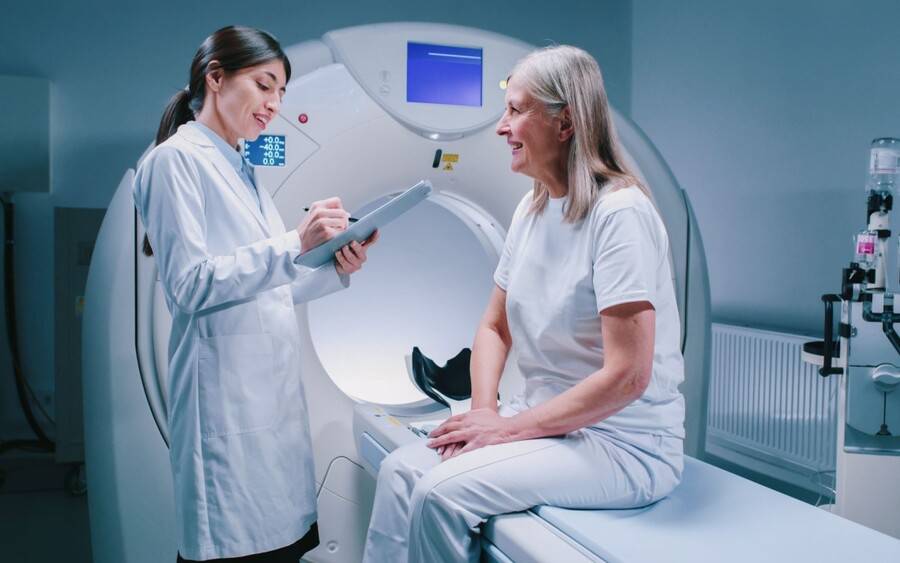Should You Get a Calcium Score Test?
CT scan detects calcium to predict heart disease risk

CT scan detects calcium to predict heart disease risk
Heart disease remains the leading cause of death worldwide for both men and women. It can develop slowly and, in many cases, people don’t even know they have heart disease until they have a heart attack or stroke. Fortunately, screening tests can help identify whether someone has an increased risk of developing heart disease before serious health problems develop.
One of the screening tools used to help detect heart disease in its earliest stages is a coronary artery calcium (CAC) scan, more commonly called a calcium score test. Over time, a substance called plaque can build up in the arteries that supply blood to your heart; eventually, these buildups can reduce or completely cut off the flow of blood to the heart muscle.
Plaque is composed of fat, cholesterol, calcium and other materials. As plaque hardens, it creates calcium deposits. A calcium score test is a type of CT (computed tomography) imaging scan that looks for such deposits in the arteries. The test is noninvasive and painless. It is usually done at an imaging center and takes about 15 minutes.
How is your calcium score determined?
Calcium shows up clearly on CT images, so doctors can measure how much is present in the coronary arteries.
“Your calcium score is the total amount of calcium found. The higher the score, the more plaque buildup is present,” explains Peter Morcos, MD, a cardiologist at Scripps Clinic Rancho San Diego. “A higher score usually translates to a greater risk of heart disease.”
Here’s a breakdown of what calcium scores mean:
- 0: No calcium detected. Very low likelihood of coronary artery disease.
- 1–99: Small amount of calcium. Mild evidence of plaque buildup and some heart disease risk.
- 100–399: Moderate amount of calcium. Moderate to high risk of a heart event in the future.
- 400 or greater: Large amount of calcium. Significant plaque buildup and high risk of heart disease or a cardiac event.
“These scores can be very helpful, but it’s important to remember that the test doesn’t detect plaque that hasn’t calcified yet, nor does it measure how much of the artery is blocked by plaque,” says Dr. Morcos. “So, a low score doesn’t guarantee that you are completely risk-free, but it does suggest a lower chance of having a heart problem in the near future.”
Should you have a calcium score test?
Not everyone needs a calcium score test. It’s generally most useful for people who don’t already have diagnosed heart disease but have some risk factors and want more information about their condition.
For example, if you’re age 50 and have slightly elevated cholesterol, your doctor might want to determine your calcium score before prescribing medication. A low calcium score may suggest you can safely hold off, while a higher score may indicate that it’s appropriate to start treatment.
In addition, the test can motivate lifestyle changes. Having a higher test score often helps patients pay more attention to their diet and exercise choices.
You may benefit from a calcium score test if you:
- Are a man over 40 or a woman over 50
- Have a family history of early heart disease
- Have risk factors, such as high blood pressure, high cholesterol, diabetes, obesity or smoking
- Are unsure about starting cholesterol-lowering medications, such as statins, and want more information about your actual heart disease risk
Insurance doesn’t always cover the test, and prices range from $100 to $400 out of pocket.
Whether you should get a calcium score test depends on your personal risk profile and your doctor’s advice. If you’re young and healthy with no risk factors, the test probably isn’t necessary. If you’ve already been diagnosed with heart disease or have symptoms, such as chest pain or high blood pressure, a calcium score test may not be right for you.
“But if you’re in the middle, the calcium score test can be an excellent tool to help guide decisions about lifestyle, medications and long-term monitoring,” says Dr. Morcos. “It’s certainly something to talk about with your doctor.”